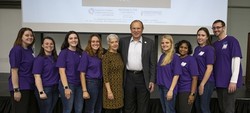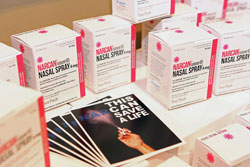Monmouth’s Social Work Society hosted their 14th annual Teach- In to educate the surrounding community on the opioid crisis, on Tuesday, Nov. 12.
The event began with opening remarks from the Social Work Society and Robin Mama, Ph.D., Dean of the School of Social Work.
Afterwords, there was a keynote from former Senator Raymond Lesniak. He said, “I remember getting a tooth extracted and getting a 30-day supply of Percocet. Actually, what I needed was a week supply of Tylenol.”
He explained the complications he faced, while in office, trying to get addictions listed as disabilities in New Jersey. “Unfortunately, it is such a difficult thing to achieve because there is only X amount of dollars available for people with disabilities. If you add another disability, then all the other folks with disabilities will be short changed. So, you would need the increase the [spending] to make room for this.”
William Wood, an Adjunct Professor of Social Work, explained that the speakers and workshop presenters were informative and that, given the ongoing issues with opioids and other addictions, the focus of the event was “timely and relevant.”
After the keynote, there were 15 different breakout sessions that students and professionals were invited to attend. The sessions included Eradicating Stigmas on Addiction and Sexual Assault on College Campuses, The knowns and Unknowns of the Vaping Crisis, Unpacking the CVS Catch My Breath E-cigarette Curriculum, Medication, Mommy and Me, Gambling and Video Gaming – A Public Health Issue, How function influences patient outcomes, a guide for the clinician and user, Breaking the Peer Pressure Stigma, Addiction, the Neurobiology of Attachment/Trauma and Healing through the Relational Lens, Stigma within Medication Assisted Treatment, YMCA Matawan Prevention and Intervention Services, My Personal Journey: Experience, Strength, & Hope, Utilizing Multi-Family Therapy in Substance Abuse Treatment, Living in Recovery from Addiction, The New Look of Nicotine Addiction: Vaping, and What works in Prevention.
The presenters’ topics ranged from the issues surrounding vaping and e-cigarettes, to stigma, prevention, personal experiences, gambling, and how substance abuse affects the family, and addiction and sexual assault on college campuses.
“Speakers successfully examined the various aspects of addiction, including how it affects individuals, families, and communities and also offered some viable solutions for addressing the problem going forward,” Wood continued.
Kaitlin McCarthy from Prevention First, closed the event with a call to action that detailed the main ideas of fellow speakers in order to strategize ways to combat the crisis. The group was able to come up with 13 suggestions to improve the crisis.
The primary suggestion was that society needs to start educating people on existing laws and policies established to help people. On a micro-level, the group suggested that on-campus Narcan training, universal drug screening during pregnancy, and changing insurance policies services should be offered.
Wood explained that the event provided students pursuing social work with insight into what social workers truly do and learn how the profession solves social issues. “The program was well balanced, as it explored prevention, the clinical processes involved in treatment and ongoing sobriety, and relevant structural issues,” he said.
Kailey Monteiro, a junior social work student, added, “The Teach-In was an excellent learning experience for gaining a deeper understanding of the ways in which drugs have greatly impacted so many people’s lives.”
Monteiro continued, “I believe that it is important for social workers to be knowledgeable on this topic as they may be consistently working with victims of trauma and/or abuse and that those victims are sometimes likely to turn to drugs as a way of seeking relief. It will help social workers to gain a deeper understanding of what their clients are going through and they can use this knowledge to help steer their clients toward resources and, hopefully, away from the drugs.”
Wood added, “The conference was excellent. Convening conferences requires a lot of time, coordination, and attention to detail, and I was impressed with how well the event’s organizers were able to effectively manage those tasks and produce a high-quality educational program that moved along seamlessly.”
Social Work Society Club Advisors Cory Cummings, Ph.D., LCSW, an Assistant Professor of Social Work, and Sanjana Ragudaran, Ph.D., MSW, a Specialist Professor of Social Work, agreed that the event was effective in providing a space for information sharing and fostering dialogue on the opioid crisis.
“It is never easy to organize an event on this scale. However, our community partner Prevention First and the Social Work Society board members are highly engaged, and this made the entire process seamless. Senator Lesniak delivered a dynamic keynote address and we were able to provide 15 different relevant and engaging breakout sessions on this important topic – a true testament to good collaboration,” Cummings and Ragudaran said in a joint statement.
PHOTO COURTESY of Monmouth University



